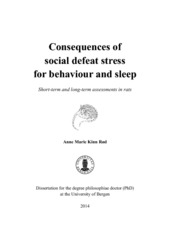| dc.contributor.author | Rød, Anne Marie Kinn | |
| dc.date.accessioned | 2014-07-03T07:46:24Z | |
| dc.date.available | 2014-07-03T07:46:24Z | |
| dc.date.issued | 2014-04-08 | eng |
| dc.identifier.isbn | 978-82-308-2940-0 | eng |
| dc.identifier.uri | https://hdl.handle.net/1956/8049 | |
| dc.description.abstract | Social stressors play a major role in the pathogenesis of affective disorders like anxiety and depression. These disorders are associated with altered behaviour (i.e. locomotor activity, harm avoidance, startle response, anhedonia and sexual behaviour), sleep alterations and abnormalities in the stress response. The animal social defeat (SD) model is based on a natural conflict situation where a male intruder rat eventually subordinates itself to an unfamiliar territorial resident conspecific. The effects of defeat are studied in the intruder rat. The main purpose was to study the face validity of the SD model for affective disorders by investigating short-term and long-term consequences of single and/or double exposure to SD on behaviour and sleep in rats. In particular, the intention was to evaluate if SD could reproduce the alterations in locomotor activity, harm avoidance, startle response, anhedonia, sexual behaviour, stress responses and sleep parallel to those observed in patients with affective disorders. Social defeat induced low activity in the central sector of the open field (OF) (Paper I), indicating high harm avoidance which may reflect anxiety-like or depression-like behaviour. No short-term or long-term effects were seen on total locomotor activity in the OF (Papers I and II). Further, a lack of habituation to the OF across days was seen, which may reflect long-lasting heightened anxiety (Papers I and III). Overall, in the elevated plus maze (EPM) test, SD rats showed less total locomotor activity, less percentage time and less activity on the open arms, lasting up to 3 weeks after defeat (Paper II), possibly reflecting anxiety-like behaviours. High acoustic startle responses (ASR) were seen as a long-term effect of SD, probably reflecting an anxiety-like state (Paper II). A short-lasting reduced preference for sucrose was seen (Paper II), indicating an anhedonic state that may be interpreted as a transient anxiety-like symptom. Sexual behaviour was not affected (Paper I). As a group, SD rats did not show altered corticosterone responsiveness to OF exposure (Paper III). The SD rats showed a short-term increase in duration of slow wave sleep (SWS) 2 and sleep fragmentation (Paper I). Overall, SD rats did not show long-term effects on sleep or EEG power (Paper III). The effects of SD on sleep may be interpreted as anxiety, because they were short-lasting and the common sleep alterations seen in depression were not induced (e.g. reduced SWS2 and REM sleep alterations). A secondary aim was to compare effects of SD to the effects of inescapable footshock (IFS) (Paper II). The two stressors induced a similar short-term effect on sucrose preference and similar long-term anxiety-like behaviours in the EPM test. Contrary to what was expected, SD rats showed the highest ASR, while IFS rats showed the lowest total activity in the OF test. The results may reflect fundamental differences between SD and IFS. Another secondary aim was to explore the relationship between levels of corticosterone prior to SD or IFS stressor, and the different post-stressor behaviours (Paper II). Low pre-stress corticosterone level was expected to be associated with anxiety-like behaviours following stress. Overall, such a relationship was not found. Contrary to what was expected, the SD rats with high pre-stressor corticosterone level showed the greatest ASR, while IFS rats with low pre-stress corticosterone level did not show alterations in ASR. This further supports differences between the SD and the IFS stressor. The final secondary aim was to investigate differences in effects of SD on behaviour and sleep in two subgroups of rats with different coping styles in the SD (Paper III). Contrary to what was expected, rats fighting back in the SD confrontation showed longer latency to leave the start box, and spent less time in the OF arena compared to those not fighting back, indicating anxiety-like behaviour. They also showed more fragmentation of sleep in SWS1 and SWS2. The results may suggest that rapid submission during SD may be more adaptive than surrender after a longer fight, given these outcome measures. In conclusion, the studies presented in this thesis show that exposure to SD induced both short-term and long-term consequences for multiple behavioural features and at least short-term consequences for sleep. The behavioural consequences of SD are different from those of IFS. The studies generally support a high degree of face value for the SD model as a model for affective disorders, more relevant to anxiety than to depression. | en_US |
| dc.language.iso | eng | eng |
| dc.publisher | The University of Bergen | eng |
| dc.relation.haspart | Paper I: Kinn AM, Grønli J, Fiske E, Kuipers S, Ursin R, Murison R, Portas CM. 2008. A double exposure to social defeat induces sub-chronic effects on sleep and open field behaviour in rats. Physiology & Behavior 95(4), 553- 561. The article is not available in BORA due to publisher restrictions. The published version is available at: <a href="http://dx.doi.org/10.1016/j.physbeh.2008.07.031" target="blank">http://dx.doi.org/10.1016/j.physbeh.2008.07.031</a> | eng |
| dc.relation.haspart | Paper II: Kinn Rød AM, Milde AM, Grønli J, Jellestad FK, Sundberg H, Murison R. 2012. Long-term effects of footshock and social defeat on anxiety-like behaviours in rats: Relationships to pre-stressor plasma corticosterone concentration. Stress 15(6), 658-670. The article is not available in BORA due to publisher restrictions. The published version is available at: <a href="http://dx.doi.org/10.3109/10253890.2012.663836" target="blank"> http://dx.doi.org/10.3109/10253890.2012.663836</a> | eng |
| dc.relation.haspart | Paper III: Kinn Rød AM, Murison R, Mrdalj J, Milde AM, Jellestad FK, Øvernes LA, Grønli J. Effects of social defeat on sleep and behaviour: importance of the confrontational behaviour. Physiology & Behavior 127, 54-63. The article is not available in BORA due to publisher restrictions. The published version is available at: <a href="http://dx.doi.org/10.1016/j.physbeh.2014.01.010" target="blank">http://dx.doi.org/10.1016/j.physbeh.2014.01.010</a> | eng |
| dc.title | Consequences of social defeat stress for behaviour and sleep. Short-term and long-term assessments in rats | eng |
| dc.type | Doctoral thesis | |
| dc.rights.holder | Copyright the author. All rights reserved | |
| dc.identifier.cristin | 1127424 | |

